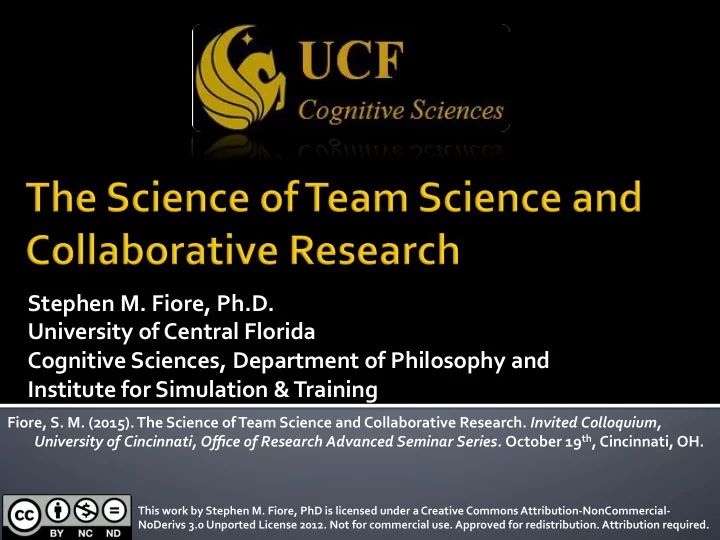

Stephen ¡M. ¡Fiore, ¡Ph.D. ¡ University ¡of ¡Central ¡Florida ¡ Cognitive ¡Sciences, ¡Department ¡of ¡Philosophy ¡and ¡ ¡ Institute ¡for ¡Simulation ¡& ¡Training ¡ Fiore, ¡S. ¡M. ¡(2015). ¡The ¡Science ¡of ¡Team ¡Science ¡and ¡Collaborative ¡Research. ¡ Invited ¡Colloquium, ¡ University ¡of ¡Cincinnati, ¡Office ¡of ¡Research ¡Advanced ¡Seminar ¡Series. ¡ October ¡19 th , ¡Cincinnati, ¡OH. ¡ This ¡work ¡by ¡Stephen ¡M. ¡Fiore, ¡PhD ¡is ¡licensed ¡under ¡a ¡Creative ¡Commons ¡Attribution-‑NonCommercial-‑ NoDerivs ¡3.0 ¡Unported ¡License ¡2012. ¡Not ¡for ¡commercial ¡use. ¡Approved ¡for ¡redistribution. ¡Attribution ¡required. ¡
¡ Part ¡1. ¡Laying ¡Founda1on ¡for ¡a ¡ Science ¡of ¡Team ¡Science ¡ ¡ Part ¡2. ¡Developing ¡the ¡Science ¡of ¡ Team ¡Science ¡ ¡ Part ¡3. ¡Applying ¡Team ¡Theory ¡to ¡ Scien1fic ¡Collabora1on ¡ § 3.1. ¡Of ¡Teams ¡and ¡Tasks ¡ § 3.2. ¡Leading ¡Science ¡Teams ¡ § 3.3. ¡Educa1ng ¡and ¡Training ¡Science ¡Teams ¡ § 3.4. ¡Interpersonal ¡Skills ¡in ¡Science ¡Teams ¡ ¡ Part ¡4. ¡Resources ¡on ¡the ¡Science ¡of ¡Team ¡Science ¡
ISSUE ¡-‑ ¡ Dealing ¡with ¡Scholarly ¡Structure ¡ Disciplines ¡are ¡distinguished ¡partly ¡for ¡historical ¡reasons ¡ ¡ and ¡reasons ¡of ¡administrative ¡convenience ¡(such ¡as ¡the ¡ organization ¡of ¡teaching ¡and ¡of ¡appointments)... ¡ ¡But ¡all ¡ this ¡classification ¡and ¡distinction ¡is ¡a ¡comparatively ¡ unimportant ¡and ¡superficial ¡affair. ¡ ¡ We ¡are ¡not ¡students ¡ of ¡some ¡subject ¡matter ¡but ¡students ¡of ¡problems. ¡ ¡And ¡ problems ¡may ¡cut ¡across ¡the ¡borders ¡of ¡any ¡subject ¡ matter ¡or ¡discipline ¡ (Popper, ¡1963). ¡ ISSUE ¡-‑ ¡ Dealing ¡with ¡University ¡Structure ¡ What ¡is ¡critical ¡to ¡realize ¡is ¡that ¡“the ¡way ¡in ¡which ¡our ¡universities ¡have ¡divided ¡up ¡the ¡ ¡ sciences ¡does ¡not ¡reflect ¡the ¡way ¡in ¡which ¡nature ¡has ¡divided ¡up ¡its ¡problems” ¡(Salzinger, ¡ 2003, ¡p. ¡3) ¡ ¡ To ¡achieve ¡success ¡in ¡scientific ¡collaboration ¡we ¡must ¡surmount ¡these ¡challenges. ¡ Popper, ¡K. ¡(1963). ¡ Conjectures ¡and ¡Refutations: ¡The ¡Growth ¡of ¡Scientific ¡Knowledge. ¡London: ¡Routledge. ¡ Salzinger, ¡K. ¡(2003). ¡ ¡Moving ¡Graveyards. ¡ ¡ Psychological ¡Science ¡Agenda, ¡Summer, ¡3. ¡ Washington, ¡DC: ¡ ¡ American ¡Psychological ¡Association. ¡
¡ Consider ¡what ¡was ¡published ¡on ¡this ¡topic ¡in ¡the ¡ journal ¡ Science : ¡ ¡ § “The ¡interdisciplinary ¡approach ¡is ¡becoming ¡one ¡of ¡the ¡prominent ¡ characteristics ¡of ¡[science] ¡and ¡represents ¡a ¡synthesizing ¡trend ¡ which ¡focuses ¡the ¡specialized ¡research ¡techniques ¡on ¡problems ¡ common ¡to ¡a ¡number ¡of ¡separate ¡disciplines. ¡Such ¡cooperative ¡ research ¡has ¡to ¡overcome ¡serious ¡obstacles ¡when ¡operating ¡ within ¡the ¡existing ¡departmentalized ¡framework ¡of ¡the ¡ universities. ¡It ¡appears ¡that ¡real ¡progress ¡in ¡this ¡direction ¡will ¡be ¡ made ¡in ¡institutions ¡which ¡are ¡organized ¡on ¡a ¡permanent ¡and ¡ frankly ¡cooperative ¡basis. ¡Psychologically, ¡interdisciplinary ¡ research ¡requires ¡not ¡only ¡abstract, ¡theoretical ¡intelligence…, ¡but ¡ also ¡‘social ¡intelligence.’ ¡Cooperative ¡work ¡is ¡a ¡social ¡art ¡and ¡has ¡ to ¡be ¡practiced ¡with ¡patience.” ¡ ¡
What ¡is ¡informa1ve ¡here? ¡ ¡ ¡ Increasing ¡influence/importance ¡of ¡ interdisciplinarity ¡as ¡method ¡of ¡inquiry ¡ ¡ Challenge ¡of ¡interdisciplinarity ¡ dis9nguished ¡in ¡2 ¡ways: ¡ 1) ¡The ¡problem ¡of ¡ INFRASTRUCTURE ¡-‑ ¡tangible ¡and ¡tacit ¡ • Inherent ¡challenge ¡associated ¡with ¡structure ¡of ¡the ¡modern ¡ university ¡-‑ ¡ the ¡discipline ¡bound ¡department ¡ • Tacit ¡norms ¡which ¡prevent ¡or ¡s9fle ¡interac9on ¡amongst ¡them ¡ 2) ¡The ¡problem ¡of ¡ INTERACTION ¡ • Difficulty ¡in ¡ communica1ng ¡across ¡disciplines ¡ • Need ¡for ¡pa9ence ¡and ¡ par1cular ¡form ¡of ¡social ¡intelligence ¡to ¡ effec9vely ¡collaborate ¡
¡ Anyone ¡familiar ¡with ¡some ¡manner ¡of ¡cross-‑disciplinary ¡collaborative ¡ effort ¡will ¡likely ¡have ¡experienced ¡some ¡or ¡all ¡of ¡these ¡factors ¡ § So ¡one ¡might ¡wonder ¡why ¡this ¡quote ¡is ¡particularly ¡informative ¡ ¡ What ¡is ¡informative ¡is ¡not ¡ what ¡was ¡said, ¡ it ¡is ¡ when ¡it ¡was ¡said ¡ § Written ¡well ¡over ¡a ¡half ¡century ¡ago ¡ in ¡one ¡of ¡first ¡articles ¡specifically ¡ addressing ¡interdisciplinary ¡research ¡ (Brozek ¡& ¡Keys, ¡1944). ¡ ¡ ¡ Science ¡still ¡struggles ¡so ¡why ¡should ¡we ¡think ¡anything ¡will ¡change? ¡ ¡ § Should ¡we ¡be ¡so ¡bold ¡as ¡to ¡think ¡that ¡we ¡have ¡a ¡better ¡chance ¡at ¡ overcoming ¡these ¡challenges ¡than ¡those ¡from ¡generations ¡before ¡us? ¡ ¡
YES ¡-‑ ¡for ¡THREE ¡main ¡reasons: ¡ Increased ¡ emphasis ¡on ¡collabora1ve ¡research ¡projects ¡that ¡create ¡a ¡team ¡ 1. of ¡scholars ¡cuIng ¡across ¡disciplines ¡to ¡address ¡complex ¡phenomena ¡ Policy, ¡Academia, ¡and ¡Industry ¡communi9es ¡all ¡making ¡more ¡of ¡a ¡ 2. concerted ¡effort ¡to ¡understand ¡and ¡improve ¡collabora9ons ¡ Tremendous ¡ growth ¡in ¡study ¡and ¡understanding ¡of ¡teams ¡ 3. • It ¡is ¡the ¡scien0fic ¡study ¡of ¡teamwork ¡that ¡could ¡ be ¡the ¡true ¡catalyst ¡for ¡change ¡ – Matured ¡into ¡its ¡own ¡area ¡of ¡inquiry ¡ producing ¡a ¡rich ¡base ¡of ¡knowledge ¡ – Helped ¡us ¡to ¡beQer ¡understand ¡the ¡complex ¡ coordina9ve ¡processes ¡engaged ¡by ¡teams ¡
¡ What ¡do ¡we ¡mean ¡by ¡teams ¡ § Multiple ¡information ¡sources ¡and ¡intensive ¡communication ¡ § Task-‑relevant ¡knowledge ¡with ¡meaningful ¡task ¡interdependencies ¡ § Affective ¡and ¡attitudinal ¡factors ¡influence ¡group ¡dynamics ¡ § Coordination ¡among ¡members ¡with ¡specialized ¡roles ¡ ¡ Reframing ¡science ¡collaboration ¡as ¡a ¡process ¡ of ¡teamwork ¡to ¡be ¡mastered ¡(Fiore, ¡2008) ¡ § Allows ¡us ¡to ¡leverage ¡social ¡sciences ¡ § Changes ¡question ¡to ¡understanding ¡team ¡ activities ¡necessary ¡for ¡science ¡ § Makes ¡the ¡achievement ¡and ¡measurement ¡ of ¡team ¡science ¡more ¡tractable ¡ Fiore, ¡S. ¡M. ¡(2008). ¡Interdisciplinarity ¡as ¡teamwork: ¡How ¡the ¡science ¡of ¡teams ¡can ¡inform ¡team ¡ science. ¡ Small ¡Group ¡Research, ¡39(3), ¡251-‑277. ¡
¡ Part ¡1. ¡Laying ¡Founda1on ¡for ¡a ¡ Science ¡of ¡Team ¡Science ¡ ¡ Part ¡2. ¡Developing ¡the ¡Science ¡of ¡ Team ¡Science ¡ ¡ Part ¡3. ¡Applying ¡Team ¡Theory ¡to ¡ Scien1fic ¡Collabora1on ¡ § 3.1. ¡Of ¡Teams ¡and ¡Tasks ¡ § 3.2. ¡Leading ¡Science ¡Teams ¡ § 3.3. ¡Educa1ng ¡and ¡Training ¡Science ¡Teams ¡ § 3.4. ¡Interpersonal ¡Skills ¡in ¡Science ¡Teams ¡ ¡ Part ¡4. ¡Resources ¡on ¡the ¡Science ¡of ¡Team ¡Science ¡
Recommend
More recommend